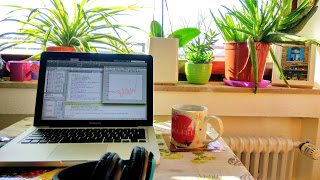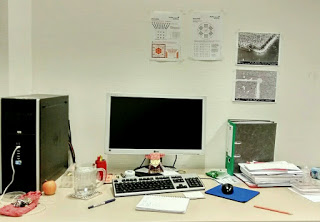I am Pranoti Kshirsagar and This is How I Work
 Today, I have the pleasure of interviewing Pranoti Kshirsagar for the “How I Work” series. Pranoti was born and raised in Nagpur, India. After finishing her bachelors in technology in Metallurgical and Materials Science and Engineering, she moved to Germany. She holds a masters degree in Materials Science from the University of Stuttgart. Check out her website or follow her on Twitter.
Today, I have the pleasure of interviewing Pranoti Kshirsagar for the “How I Work” series. Pranoti was born and raised in Nagpur, India. After finishing her bachelors in technology in Metallurgical and Materials Science and Engineering, she moved to Germany. She holds a masters degree in Materials Science from the University of Stuttgart. Check out her website or follow her on Twitter.
Current job: Working on my PhD
Current location: Tuebingen, Germany
Current mobile device: Xiaomi Redmi Note 3 and Mi 4i
Current computer: Macbook Pro
Can you briefly explain your current situation and research to us?
I am developing a reliable and reproducible fabrication technique for integrating carbon-based materials into microelectrode arrays (MEAs) which are used in biomedical applications. MEAs are used to record signals from cells such as neurons. The focus of my work is on two wonderful forms of carbon: carbon nanotubes (CNTs) and graphene. Both these materials are extensively researched in the past two decades, although their entry in biomedical field is relatively recent.
My work is fairly interdisciplinary. As a materials scientists I produce CNTs and graphene out of thin air (read: gases in a vacuumed chamber), integrate into the MEAs and voila, the device is ready for the cells to grow on. Our biologists then culture either cardiac or neuron cells on my devices. If they are in the mood, my devices host retina slices. Goal is to record cellular activity from different kinds of cells and maybe in the future excite the neurons with laser and witness the information transfer.
So in a nutshell, I collaborate with chemists, physicists, neurobiologists, biomedical technologists and several other field experts.
What tools, apps and software are essential to your workflow?
I use a lot of machines for the characterization of carbon. A few of the common ones are the atomic force microscope, the scanning electron microscope and the Raman spectrometer. I use a bunch of software packages like MATLAB, Origin, Coreldraw and TeXstudio to name a few.
What does your workspace setup look like?
I work in the labs at my institute and also at the university. So far I have a office at the institute, home and soon will be getting a desk at university.
 |
| home office |
 |
| work desk |
What is your best advice for productive academic work?
There are several pieces of advice I can offer. 😀
Smart time management is the key. The quality of the work is more important than the quantity of the work. Always have a goal in mind when working on a project / report. Every once in a while take a step back and judge your work from a third person’s point of view. It helps to have the big picture in mind.
Exercise of any kind is very helpful for both physical and mental health. I am more productive and positive on the days starting with workout. Type of exercise can be of your choice jogging, gym, swimming, biking, yoga..anything that keeps you focused and pumped up. Make a schedule and stick to it.
Set personal goals. Try to be as independent as possible. Always work towards a goal. I set goals for every day, every week. Remember, big picture!
Take time off. Try to stick to working hours. Your brain needs rest. To be more precise, your brain needs to think of other aspects of life than work. Take at least a day off every week. If you worked on the weekend take a day off during the week. Go to holidays twice a year. It is very important to cut off from the lab and make a fresh start.
Treat yourself. When you finish the task at hand on or before deadline, treat yourself. It can be as small as buying yourself a butter-brezel. If you like solo travel, do it. I treated myself with a 2 month long holiday before starting PhD.
How do you keep an overview of projects and tasks?
Each working day starts with making a plan and ends with updating the plan. Everyday I take a step back and look at the progress I have made. If the day is not as productive as expected, I invest more time in the project the next day till I am at par. It helps to prioritise the projects. Not every project needs attention on daily basis. Instead of writing email to colleagues I prefer to walk down the hall and speak about the work in person.
Besides phone and computer, do you use other technological tools in work and daily life?
All my machines are very dear to me. I need all of them at least once a week.
Which skill makes you stand out as an academic?
Perspective. Motivation. Drive. Science communication.
It is very important to have the right perspective. Many scientists are unaware of where their work stands in the real world. One of the main reasons for doing a PhD should be the passion for research. This is something I miss in the aspiring PhD students.
Motivation is often lost over the course of PhD. But one has to keep the spirits high. The experiments are bound to fail hence I always have a plan B. There is a plan B1 in case plan B fails. 😀 You should believe in the power of your results. This comes in handy when presenting at conferences.
Drive to make things work is essential. As a PhD student you are expected to step in and take control of the project. Don’t rely on your supervisor / prof to solve your problems. Its YOUR PhD, not theirs. Try to solve issues yourself before approaching anyone.
Communicate your science. It is very important for future collaboration. Take advantage of the available resources to attend conferences, seminars, workshops. You should be able to explain your work in 1 min. It is very important to engage an audience of experts from varied fields in your work.
What do you listen to when you work?
This is an interesting one. I always have my headphones with me. I listen to Indian music and several other artists around the world depending on the mood and work at hand. While writing I prefer Indian music as it is comforting. In lab the music ranges from Alela Diane to Dire Straits to Artic Monkeys, the list goes on. There is so much good music out there!
What are you currently reading?
It is a tad bit difficult to keep up with reading literature other than science papers. But I try. Last book I read was pretty intense so I am giving myself some time off now. The next book on the list is ‘Alone in Berlin’. I read while commuting and before going to bed.
Are you more of an introvert or extrovert? How does this influence your working habits?
I am a very selective extrovert. My work benefits from this. At conferences and workshops I am more of an extrovert. This helps a lot with networking and communicating science. I love presenting my work in front of a diverse audience.
What’s your sleep routine like?
I go to bed between 10 pm – 11 pm and wake up between 5 am – 6 am.
What’s your work routine like?
I start work between 7 am – 8 am depending on if I was swimming or at the gym before. I work till 5 pm – 6pm.
What’s the best advice you ever received?
Research isn’t only lab-work it is also how you package your work and present it to the public.
Be aware that you are woman in science. You will have to go an extra mile every once a while to prove your worth, it’s the bitter truth.
